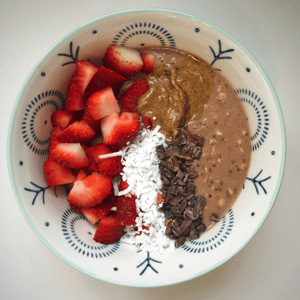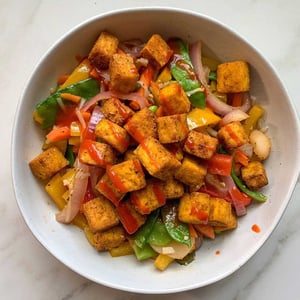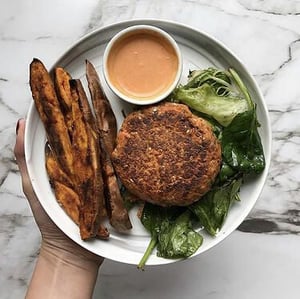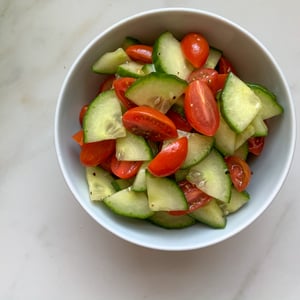
While there is no specific "PCOS diet", there are key characteristics and PCOS symptoms that can be managed through eating (or not eating) specific foods.
An PCOS diet is one that prevents nutrient deficiencies and increases energy for growth and development while also reducing risk of diet-related chronic diseases.
Since PCOS is often accompanied by weight gain and insulin resistance, your best bet is to eat a nutrient-dense diet geared towards weight management and blood sugar regulation.
Check out our list of recommended foods and recipes for PCOS management:
Fiber-rich foods: High fiber foods are important in any diet, but especially for women with PCOS.
Fiber helps slow digestion, which can cause blood sugar levels to spike less drastically after ingesting carbohydrates.
Examples of fiber-rich foods are fresh fruits and vegetables, beans and lentils, nuts and seeds, and whole grains. Check out our recipes for Overnight Oats for a high fiber breakfast!

Heart-Healthy Fats: Omega-3 fatty acids have several benefits for women with PCOS – they are anti-inflammatory in nature and help reduce inflammation.
Try to limit saturated and trans fats – choose foods that are high in omega-3 fatty acids such as fatty fish (such as salmon), nuts, seeds, flax and chia seeds.
These foods slow digestion which also lowers the chance of blood sugar spikes.
Lean Proteins: While lean proteins won't have an effect on insulin levels, they are important for weight management.
Higher fat meats are more calorie-dense and contain more saturated fat than leaner meats, so opting for lean proteins wherever possible is essential for maintaining a healthy weight.
Lean proteins include chicken, turkey, tofu, beans, nuts, seeds, and greek yogurt. Check out our Crispy Tofu Stir Fry and Chickpea Tikka Masala recipes for a lean protein-packed lunch or dinner idea!
Anti-inflammatory foods: Research shows that women with PCOS tend to have higher levels of inflammation. Researchers suspect this is in part caused by insulin resistance, but also could be related to weight gain.
Anti-inflammatory diets have been shown to improve metabolism and reproduction in women with PCOS. Anti-inflammatory foods include berries, fatty fish like salmon and tuna, broccoli, avocado, green tea, grapes, tomatoes, leafy greens, olive oil and mushrooms.
Check out our Salmon Burger and Tomato Cucumber Salad recipes for a delicious, anti-inflammatory meal or side!
Low Glycemic Index foods: The glycemic index (GI) is a measurement system that ranks foods according to their effect on your blood sugar levels.
Foods with lower glycemic index don’t cause insulin levels to rise as much or as quickly as other foods with a higher glycemic index.
Examples of foods with a low GI include whole grains, legumes, nuts, fruits and green vegetables. The more complex carbs, the better!
Complex carbohydrates pack in more nutrients than simple carbohydrates. They’re high in fiber and digest slower which makes them more filling. This also helps manage blood sugar spikes after meals!
Not only is it important to eat certain foods to regulate PCOS, it’s also important to note when you’re eating them. Healthy eating plan for women with PCOS includes:
- Eating four to five meals or snacks daily
- Don’t skip meals
- Get a variety of foods that include fruits, vegetables, grains, proteins and dairy
- Try getting protein at all meals and snacks – nut butters, lean meats, fish, tofu, beans, etc.
Many women with PCOS will be advised to adapt or change their diet accordingly – which is where this information comes into play!
We know that diet plays a significant role in regulating blood glucose and insulin levels - so the best PCOS diet is one that helps regulate insulin and body weight.
Research shows that a diet low in saturated fat and high in fiber from predominantly low-glycemic-index-carbohydrate foods gets the best results. These specific eating patterns can ultimately alleviate symptoms of PCOS.

Kaitlyn Willwerth is a Registered Dietitian at OnPoint Nutrition. Kaitlyn's work focuses on providing individualized health and lifestyle coaching and, most importantly, support. She is a Certified LEAP Therapist and has also completed the Monash University 'Low FODMAP Diet for IBS' online training course for health professionals.








